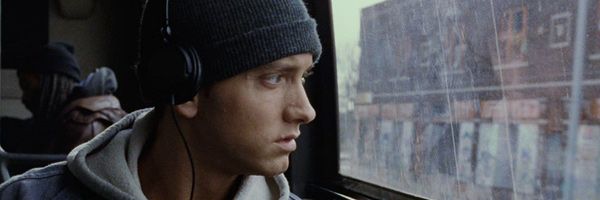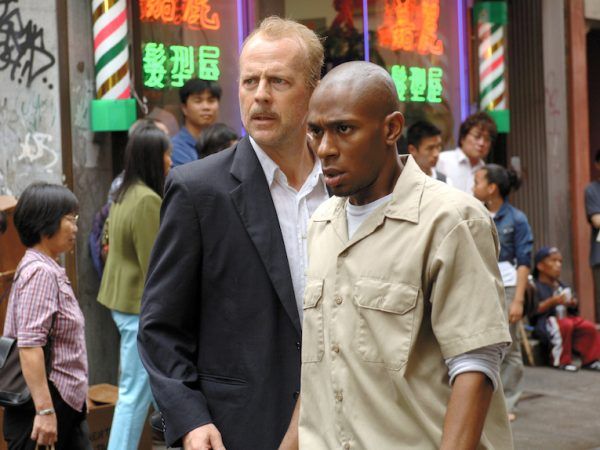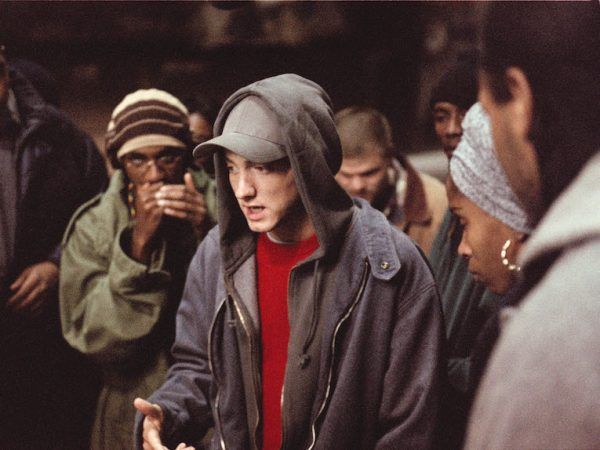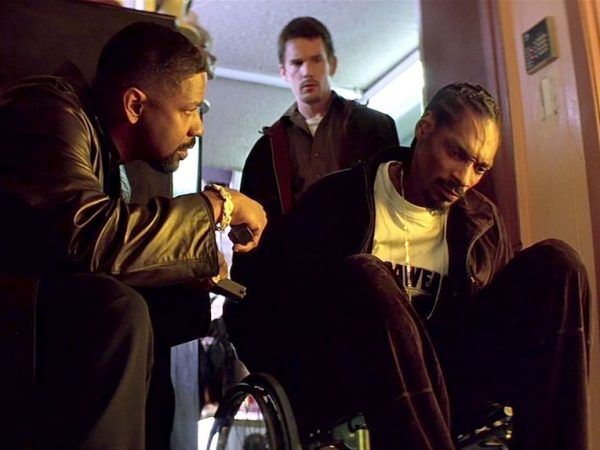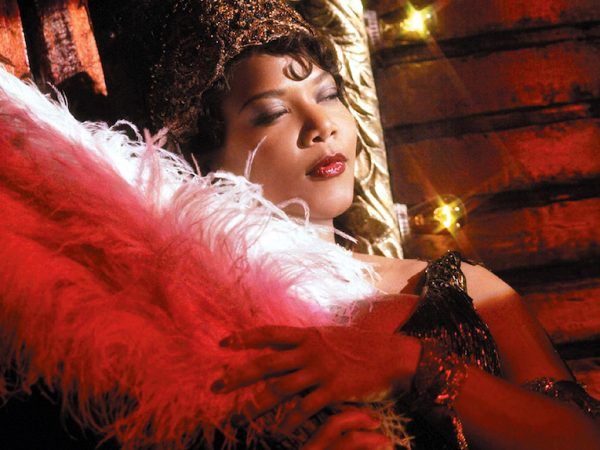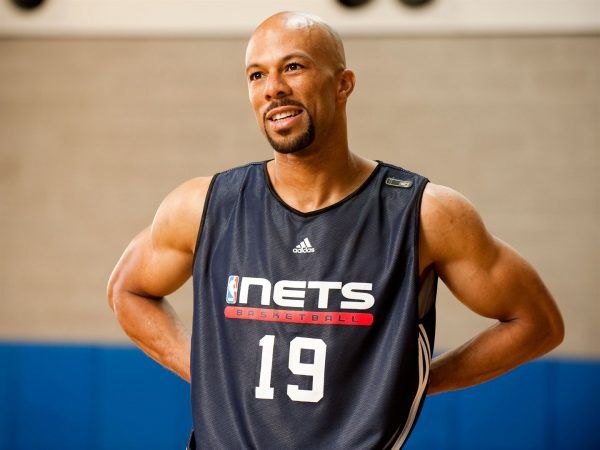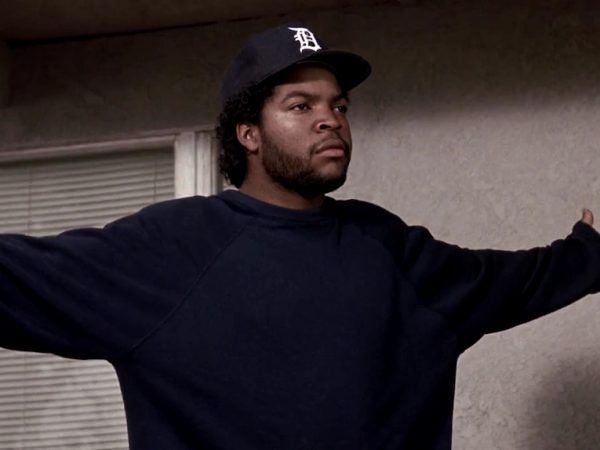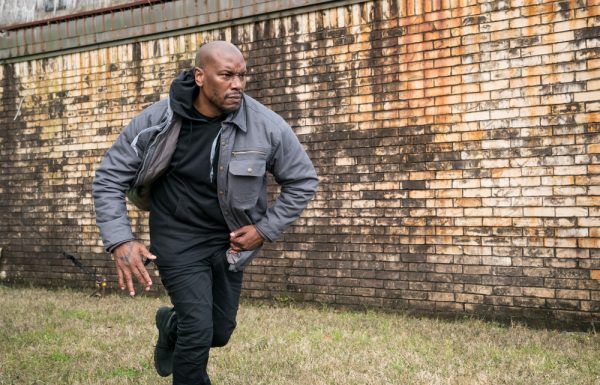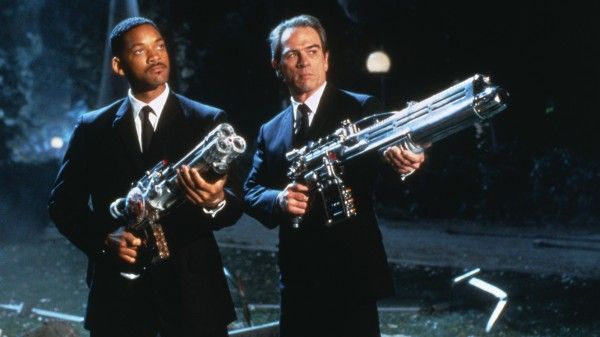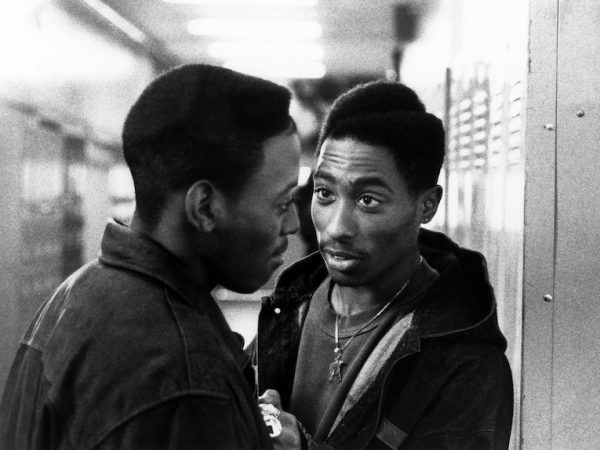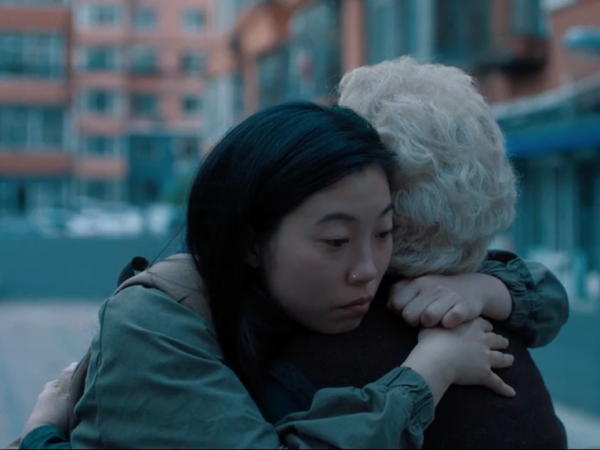Perhaps more than any other genre of music, hip-hop’s foundation is storytelling. At its most naked and pure, it’s the art of putting lyrics over a beat. Without a need for technical fireworks like “a melody” or “complicated chord progressions” (which, of course, plenty of ever-evolving hip-hop has), many of the best rap tunes lock in as narrations of narratives, self-contained stories that give you a sense of place, time, and perspective with startling clarity. This facet of hip-hop, essential to its success as a cultural touchstone, might be why rappers make such good actors.
From T.I. in the MCU, to Mark Wahlberg fightin’ robots, to Post Malone appearing in G-D Bud Light Super Bowl commercials, our culture is saturated with rappers turning their skills on the mic into skills in front of the camera. These rappers tend to acclimate to this new mode of performance quite seamlessly -- after all, they’re still fundamentally telling stories, they’re just not rhymed to a beat. In honor of this lovely intersection between movies and music -- and in honor of the 4K blu-ray release of the classic Boyz n the Hood -- we’ve got 10 of the best movie performances from rappers. And if you don’t know, now you know.
Yasiin Bey - 16 Blocks
Yasiin Bey, the artist formerly known as Mos Def, is your favorite rapper’s favorite rapper. His flow is smooth, controlled, locked in to the formative building blocks of hip-hop, indebted to the powers of storytelling. He’s always been a quieter, more contained voice in hip-hop -- even a song with a title like “Ms. Fat Booty” is less a club-rattler to get you dancing and more an exacting story told by one of your most sensitive friends. When Bey translates his skills to the screen, it fits like a glove -- all of his qualities as a rapper make perfect sense when applied to the tenets of screen acting. From comedies like The Hitchhiker’s Guide to the Galaxy, grim indies like The Woodsman, and actioners like The Italian Job (2003), Bey acquaints himself uniquely and expertly to the vocabulary of film performance -- contemporary actors he reminds me of include LaKeith Stanfield and Adam Driver, making a trio noted by a strong interior life that only burbles to the surface when it absolutely needs to. For my money, Bey combined all of his performance skills most effectively in the underrated Bruce Willis action-drama 16 Blocks. Willis plays a tired veteran cop tasked with taking care of Bey’s wiry, talkative witness. As they uncover a conspiracy of corruption, Willis must transport Bey -- you guessed it -- 16 blocks. The film, the final one directed by Richard Donner (Superman), luxuriates in genre tropes. But Bey (and Willis, it must be said) is an expert at playing within the sandbox while also experimenting outside of it. Bey’s take on this fast-talking, marble-mouthed man emanates strong empathy, grounded realism, and frankly, love. This is perhaps the most sentimental “corrupt cop” picture you’ll ever see, and Bey’s inherent connection to the human spirit is a huge part of it.
Eminem - 8 Mile
Marshall “Eminem” Mathers won an Oscar for “Lose Yourself,” the head-nodding hip-hop anthem at the center of his gritty biopic, 8 Mile. But if you ask me, he was still snubbed at the ceremony. Because this performance is Best Actor-award worthy. Yes, he’s playing a fictionalized version of himself. And yes, he’s retelling his own life story about a working class Detroit boy who proves himself as a fierce rapper. But “playing yourself” is, frankly, an underrated skill as an actor. You so often see actors wear a different version of themselves like a “not-quite-fitting-right coat.” Eminem on the other hand, despite becoming wildly famous/infamous for crafting vulgar, violent, and downright problematic revenge fantasies out of his real life circumstances, delves deep within himself with exacting, egoless detail. Director Curtis Hanson, who never met a genre he didn’t crush, is no doubt a huge part of this transformative performance, and Em’s castmates like Kim Basinger, Mekhi Phifer, Michael Shannon, Anthony Mackie, and the late great Brittany Murphy add a rich tapestry of authenticity to the story. But we cannot and should not count out Em’s centralized performance as Jimmy "B-Rabbit" Smith, Jr., a man whose desires to dream crackle with universality even while the details are exactingly specific. In an era where Eminem surprise releases albums (Kamikaze, Music to Be Murdered By) mostly full of anonymously fast-spoken boasts and cringe-inducing references, it’s so refreshing to be reminded of how great an artist he can be when he allows himself to become vulnerable. Also: If you want different spins on Mr. Mathers “playing himself,” check out his hilarious cameos in Judd Apatow’s Funny People and Seth Rogen/Evan Goldberg’s The Interview.
Snoop Dogg - Training Day
Calvin “Snoop Dogg” Broadus is, and I cannot stress this enough, the Doggfather of rap. He’s likely the “coolest” rapper who will ever live -- his radio classics like “Gin and Juice,” “Drop it Like it’s Hot,” and “The Next Episode” (technically a Dre tune but, c’mon, “la di da di da”) will cause heads to nod at every cookout, pool party, and road trip from here to eternity. His effervescent, effortless “coolness” has transformed into a modern image bolstered by insane crossover appeal -- it’s downright bonkers to see one of the paragons of a genre of music so protested by old white folks rubbing elbows with the likes of Martha Stewart on the regular. And yet, despite all of this accessibility to Snoop’s image and music, it’s important to remember that he broke through in the golden age of “dangerous gangsta rap,” regularly crafting lyrics about the grim truths about gangbanging. Hell, one of his most well-known songs is literally about being charged with murder. Snoop dove back into his past realities with a brief but brutal performance in Training Day, the corrupt cop classic from Antoine Fuqua, Denzel Washington, and Ethan Hawke. If you didn’t recognize Snoop in the Washington showcase, we don’t blame you. He plays Blue, a wheelchair-bound informant who is absolutely dominated by Washington. He looks ragged, sickly, weak. Many of Snoop’s other films are goofy-ass comedies like Soul Plane and Mac & Devin Go to High School, where he gets to coat any sense of vulnerability with a sense of infectious fun. In Training Day, Snoop goes there and thensome, allowing his character’s humanity to be broken down to its core and beyond. His commitment to the small role is nothing short of incredible. Go watch this film and Bones for an “awesome underrated Snoop Dogg performance double feature,” posthaste.
Queen Latifah - Chicago
“When you’re good to Mama, Mama’s good to you.” These lyrics are, on paper, a bit silly (with apologies to iconic Broadway lyricist Fred Ebb). But rapper/singer/actor/awesome person Dana “Queen Latifah” Owens took them and sold them, earning an Oscar nomination for Best Supporting Actress in the process. The movie? Chicago, an electric adaptation of a classic Broadway musical about razzle dazzle, criminal justice, and the queasy intersection that happens when we turn real-life crime and violence into mass entertainment (in this way, Chicago is perhaps presciently in dialogue with much of the “moral panic” discourse around hip-hop culture). Some readers may only be familiar with Latifah as an actor these days, with the maestro leading iconic works like Living Single and Set It Off, and popping up in pitch-perfect supporting roles in works like Stranger Than Fiction and Hairspray. If this is you, I implore you to visit Latifah’s rap catalog. She raps with bravado and toughness, while not allowing any form of nuance to slip through her craft and purview. This intersection informs her performance in Chicago -- Latifah’s Mama is the warden of the prison that many famous female murderers are sentenced to, including Renée Zellweger and Catherine Zeta-Jones. She’s equal parts taskmaster and sympathetic ear, a dichotomy bolstered brilliantly by Rob Marshall’s delicious direction, cutting between “reality” and “fantasy” until the boundaries don’t mean anything anymore (hey, that’s the message of the movie!). Latifah plays the role close to the chest, keeping her true intentions and alliances delightfully hidden until she needs to show them -- it’s a refreshingly non-show-offy performance in an inherently show-offy movie. While Latifah didn’t win her Oscar (losing to Zeta-Jones), Latifah plays the part just right. And speaking of “just right”...
Common - Just Wright
Hollywood is keen on casting Lonnie Corant Jaman Shuka Rashid Lynn, aka Common, in gritty, grimy action flicks. Smokin’ Aces, Street Kings, Wanted, Run All Night, John Wick: Chapter 2, Suicide Squad -- is Common good in these blasts of firepower-laden testosterone? He is. He’s a very good actor, after all. But it makes me think Hollywood isn’t listening to any of Common’s music. Common is -- and I mean this as a sincere compliment -- the gentlest rapper. He is “socially conscious backpack rap” personified. His timbre aches with a sense of pleading humanity. Even in tales of crime, like the masterful “Testify,” he performs with empathy, never backsliding into crassness or exploitation. His memoir is titled Let Love Have the Last Word, for crying out loud. Thus, I think Just Wright, a gentle, pleasant, loving romantic comedy co-starring Latifah, is the perfect encapsulation of Common’s persona thus far. Set in the world of the NBA, Latifah plays a sports therapist sick and tired of being seen as “just one of the guys.” Common plays Scott McKnight, a New Jersey Nets (remember the “New Jersey Nets”?) player who gets injured -- and happens to be in love with Latifah’s roommate, Paula Patton. Latifah starts treating Common, and if you don’t know what happens to these two characters as they start working together, you must’ve never seen a romantic comedy in your life. Yes, Just Wright ain’t afraid to play the hits of romcom tropes. But it renders them so warmly and lovingly that they work with equal parts freshness and comfort. Common is a huge part of this film’s winning formula, playing a mature kind of man who’s easy to fall in love with and easy to see a future with. The film is centered around Latifah’s character, to be sure -- but Common’s effortless, understated work is anything but common.
Ice Cube - Boyz n the Hood
Boyz n the Hood, from the late great John Singleton (who became the youngest and first African-American person ever nominated for Best Director), is an unflinching look at life in 1990s South Central Los Angeles, where a community just trying to get by is marred by a rising dominance of gang culture, pervasive acts of violence, and systemic oppression embedded in every waking moment. Anchoring this masterful film is O’Shea “Ice Cube” Jackson as Doughboy. Ice Cube was a founding member of rap pioneers N.W.A. -- and if you’ve seen Straight Outta Compton, starring Cube’s son O’Shea Jackson Jr. as his father, you know just how formative to the world of hip-hop this group was, particularly as unflinching journalists of an unrepresented world. As a solo artist, Cube went on to give us classic hits like “Steady Mobbin’” and “It Was a Good Day.” Lately, as an actor, Cube has transitioned seamlessly into gruff voices of reason in comedies like Friday, 21 Jump Street, Ride Along, and Barbershop (not to mention that incredible clip of him with Kevin Hart and Conan O’Brien with a student driver). Cube is, as both a rapper and performer, a force of charisma, charming and terrifying you with his blunt delivery. In Boyz n the Hood, his film breakthrough, his Doughboy wears this bluntness like a uniform, a mask, a bulletproof vest needed just to survive. As we watch this character grow from childhood to young adulthood, Cube gives him just enough self-awareness to realize how tragic his journey -- like many journeys from the communities this film details -- truly is. His take on Doughboy feels in line with classic heroes from Greek tragedies -- his attempts to better his life are invariably bested by both his own flaws and the cruel, unjust machinations of fate. Cube delivers astonishing work in this film, walking between zones of empathy, rage, and depression with the level of acute authenticity that can only come from being such a communicator of such truths for so long.
Tyrese Gibson - Black and Blue
These days, I think Tyrese Gibson is often seen as being silly. I don’t necessarily think this is a bad thing -- his roles as comic relief in the Transformers and especially the Fast and Furious sagas are indelibly performed, giving those bonkers big-budget franchises a sense of grounded, comedic energy that they desperately need. But I do worry these high-profile roles retroactively color Gibson’s persona as being silly -- despite the fact that as a musician, he criss-crossed between R&B and rap seamlessly before modern folks like Drake and Post Malone made it the standard, even releasing a double album exploring both sides of his musical interests. And as an actor, Gibson held down the friggin’ fort in grounded dramas like Baby Boy and even gritty genre pics like Four Brothers. In 2019, Gibson reminded us all how good he can be and has been in Black and Blue -- that is, those of us who saw it, as it regrettably didn’t make too big of a splash at the box office. The film, an atypically sensitive action-drama from Deon Taylor, stars Naomie Harris as a rookie cop with a type-A personality and a genuine conscience in a world full of fucked up corruption (personified by action-drama king Frank Grillo). When Harris witnesses her colleagues gun down an informer in cold blood, she’s on the run, bumping into long-standing community member Gibson and inadvertently dragging him along for the ride. I mean this without any exaggeration or sense of irony: Gibson should’ve been nominated for an Oscar for this role. His performance is so real, so sensitive, so yearning with the desire for relief. I think Gibson’s performances, in both comedies and dramas, are marked by a sense of peacemaking, and it’s hauntingly captivating to watch him recalibrate his goal of calm in such an anger-fueled, maddening world. Gibson aches with defeat and pathos -- his character experiences the injustices of the world on a daily basis, and he thinks he knows how the stories always end. At the risk of spoilers, when Gibson realizes there is something to be done, it raises your heart rate in a great way, the perfect intersection between Gibson’s earlier character-driven work and his recent action-driven work -- without an ounce of silliness to be seen.
Will Smith - Men in Black
Now this is a story all about how clean rap god Will Smith became a dang movie star. After tearing up the charts alongside DJ Jazzy Jeff with joints like “Parents Just Don’t Understand,” and tearing up the airwaves alongside DJ Jazzy Jeff with The Fresh Prince of Bel-Air, Smith set his sights on the silver screen. Smith attacked the movies hot, showing off his precocious penchant for drama in the underrated play adaptation Six Degrees of Separation before hitting big with action-classics-to-this-day Bad Boys and Independence Day. But in my opinion, “Will Smith the movie star” didn’t fully crystallize and pop until Barry Sonnenfeld’s 1997 action-sci-fi-comedy classic Men in Black. If you haven’t watched the film in awhile, trust me: Will Smith is just. So. Good. He pops off one-liners that feel spontaneous. He plays expertly with costar Tommy Lee Jones, their mojo generated by a perfect intersection between personality friction and professional camaraderie. He physicalizes his character expertly -- our first introduction to J is as a streetwise cop running down a quick aliens on foot, and Smith's handling of physical comedy later in the picture is proof positive that he’s willing to do whatever it takes to make his movie work. Since MiB, Smith has gone on to make more “prestigious” pictures like Ali, The Pursuit of Happyness, and Concussion. But I don’t think a film has encapsulated the pure cinematic magic of “Will Smith the movie star” since Men in Black, a film that still feels like it was made yesterday, and still feels like the once-in-a-lifetime capturing of Hollywood lightning in a bottle. Matter fact, we’ll let Smith sum his performance up with a quote from the movie itself: “I make this look good.”
Tupac Shakur - Juice
Much has been said about hip-hop pioneer Tupac "2Pac" Shakur. He is, depending on who you talk to, either the best rapper who ever lived or the second best rapper who ever lived (the other person in the conversation being, of course, The Notorious B.I.G.). He changed the rap game in the 1990s, injecting the West Coast hip-hop scene with unparalleled pieces of introspection like “Dear Mama” and “Hail Mary” -- not to mention his additions to the pantheon of “California party anthems” like “California Love” and “2 of Amerikaz Most Wanted” (the other being, of course, Snoop Dogg). Sadly, Shakur was a huge component of the East Coast/West Coast rap feud that resulted in his being tragically being murdered -- in a case that, just like Biggie’s, remains unsolved. As we continue to celebrate the artistry and legacy of the complicated figure, there’s one fact about him I continue to return to: He was a classically trained Shakespearean actor. He studied the works of the Bard at Baltimore School for the Arts before namechecking works like Romeo and Juliet and Macbeth as being instrumental to his and his hip-hop peers’ methods and subjects of storytelling. This all makes Shakur’s turns to acting make much more sense -- particularly what I view to be his peak, 1992’s Juice (also, amazingly, his first film). It’s a Harlem-set crime drama about power and corruption from Ernest R. Dickerson that feels an awful lot like a Shakespearean tragedy. Shakur leads a brilliant ensemble cast alongside Omar Epps, Jermaine Hopkins, and Khalil Kain through a twisting narrative of possible chances at redemption, at ascending beyond a world full of death and conflict. But Shakur becomes addicted to the titular “juice,” a feeling gained from a sense of power, no matter the cost. As such, he squares off against Epps in a classic “devil vs. angel” narrative that’s both powerful because of its simple, mythological feelings and its contemporary, complicated surveys. Watching Shakur play his descent into “madness” should be required viewing for any aspiring actor -- Shakur knows exactly how to play the notes without over-articulation or broadness. A simple eyebrow raise makes you eight degrees more terrified of him -- lowering them makes you pity him.
Awkwafina - The Farewell
If you’ve seen Nora “Awkwafina” Lum in Crazy Rich Asians, watched her new Comedy Central show Awkwafina Is Nora from Queens, or listened to her rap music (I’m personally fond of “Pockiez,” with the telling line, “I know I act rich, but I’m broke”), you know her vibe is “loud and fun.” She’s the kind of friend who won’t turn down for anything. However, I’d argue that her work, even at its most performatively zany, has always masked a deep-seated vulnerability and sense of earnest fear -- hell, her stage name is a play on the idea of being “awkward.” But in 2019, she dove headfirst into this always-just-bubbling-under-the-surface subtext in the acclaimed indie drama The Farewell, blessing Lulu Wang’s true story with a subdued, grounded, beautiful performance. When Awkwafina’s character Billi discovers her grandmother (Zhao Shuzhen) has been diagnosed with terminal cancer, she makes the decision not to tell her. Instead, the family plans one final gathering, to send her off in ignorant bliss. Awkwafina plays the music of this nuanced role brilliantly, rightfully earning the Golden Globe for Best Actress as a result. The fact that neither she, nor the film, got any Academy Award love is mind-boggling, but it ultimately can not and will not overshadow this film’s gentle, loving, necessary brilliance. Awkwafina is a highly relatable performer, an artist who invites you into specific cultural sandboxes like “hip-hop” or “the social mores of Chinese families” with a sense of invitation and universality. The Farewell is not her farewell -- rather, it’s the promising beginning of a whole lot of new, incisive doors opening for the talented rapper-actor.

